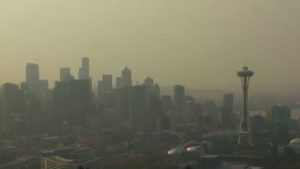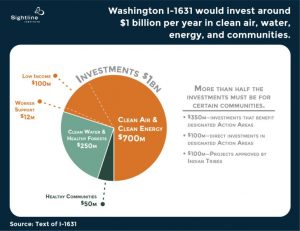The choice is simple: Do something or do nothing.
What does this city:

Have in common with this city?

Answer: They are both under siege from climate pollution:
What’s different about these cities is one is in an authoritarian country in which the government can mandate policies like the percentage of emission-free vehicles that will be sold to reduce air pollution. The other one is in a nation that has backed out of the international Paris accord, made it easier for oil and gas wells to emit methane into the atmosphere and obliterated gas mileage standards for cars, SUV’s and light duty trucks.
Fortunately, people who live in the second country have the power to share their voices and change their circumstances through grassroots activism and the power of the vote. And that’s why it’s imperative to vote Yes on Initiative 1631 by November 6th if you are a registered voter in Washington.
Climate change is real; it’s caused by man (and woman), and; we are quickly running out of time to do something about it. Initiative 1631 is your chance to act, not just for future generations, but for those who are already suffering the effects of increased droughts, wildfires and intense hurricanes. It’s your chance to say ‘I’m for clean air and clean water,’ and ‘I don’t believe we have to sacrifice a healthy environment to have a healthy economy.’
Initiative 1631 is the tip of the spear poking polluters and letting them know they no longer have impunity to profit while making life miserable for millions to breathe.
What Is Initiative 1631?
In its purest form, I-1631 is a fee on something none of us want–pollution. Unlike income taxes, property taxes or sales taxes, this is the one fee everyone should be for, no matter your age, gender, race or political identity. By making it more expensive to foul the air and water, we are incentivizing the largest polluters like oil companies to find cleaner alternatives to their current business model.
Under I-1631, Washington State’s largest greenhouse-gas producers would pay $15 per metric ton of carbon content they emit starting in 2020. That fee would increase by $2 per ton each year. Unlike some taxes, this one has a sunset date–2035–as long as the state meets its goals to reduce greenhouse gas emissions.

Economic modeling suggests those jobs will be plentiful as every million dollars invested in building a greener economy creates 12 more jobs than it would with an investment in fossil fuels. That’s 12,000 more jobs each year across the state under I-1631 than if we maintained the status quo. You don’t need to take my word for it. Read what Bill Gates has to say.
Who Pays For 1631?
The primary greenhouse gas polluters in Washington, like electric utilities, natural gas utilities, petroleum refiners and oil and gas companies will pay the fee. Some high energy manufacturers and industrial users will be exempt from the fee because they face significant competition from out-of-state industries.
Inevitably, many of these industries will pass on the costs in the form of higher prices to consumers, an argument being propagated with over $20 million in oil company profits by the No on 1631 campaign. What they won’t tell you, however, is Washingtonians are already spending nearly $7 billion on carbon-intensive fuels to power cars, trucks and buses, and more than half of that money leaves Washington state and falls right into the pockets of the same people who want you to stay addicted to oil.
Analysts say gas prices are likely to rise an estimated 14¢ per gallon if the Initiative passes. If you are struggling to make ends meet for your family or if you are on a fixed income, I get why this is alarming. Wages aren’t rising fast enough to keep up with the cost of living (especially housing), and a few extra dollars spent at the pump each week can make the difference when it comes time to pay the rent. Before you vote “No” though, I’d ask you to look at the other side of the economic ledger, the one where 1631 gets voted down. You might think you just saved yourself some money but think again.
- Those days you lost at work this summer because you couldn’t breathe are going to become a regular occurrence if you vote No.
- Your water rates are going to go up if I-1631 fails because warmer weather means less snowpack in the Cascades leading to drier reservoirs and streams in the summer.
- The state is going to need more money to fight wildfires every summer if we don’t tackle our carbon addiction, money that will need to come from somewhere (meaning you).
Voting No on 1631 isn’t free. All you will accomplish is shifting the cost to different parts of your household budget while allowing polluters to keep you addicted to their products.
Oil companies already receive $81 billion in subsidies every year from taxpayers like you and me to have the military protect their tankers on the high seas. Remember the Deepwater Horizon oil spill in the Gulf of Mexico? American taxpayers had to soak up over $15 billion of the costs to clean it up. And then there’s the human toll of young Americans being maimed and dying overseas to protect the profits which are being used to blanket the airwaves from Aberdeen to Zillah with pre-Halloween scare tactics designed to play on your economic uncertainties. Their insatiable drive for carbon-based energy knows no bounds, which is why we need to redirect their energies towards more sustainable sources to fuel our society.
Placing a fee on carbon emissions isn’t new. Our neighbors to the north in British Columbia enacted one in 2008, and their economy has been doing quite well, thank you, even with a carbon price double that of I-1631.
Why Now?
Opponents of initiatives always try to appear sympathetic to popular causes like fighting pollution to mask their real intent. The No campaign says it’s ‘concerned’ the ballot measure doesn’t apply to enough businesses, and therefore it won’t substantially reduce greenhouse gas pollution.
I don’t know about you, but I find it rich the same oil companies who buried research from their scientists for over 40 years that said fossil fuels are responsible for climate change are now so ‘concerned’ about the planet’s air quality, they feel morally obligated to spend millions to let you know we need to be even more aggressive combatting heat-trapping gasses in the atmosphere. That’s why, regrettably, they have to oppose 1631. My people call that chutzpah.
The reality is the Washington State Legislature has been trying to pass bills making it more expensive to emit carbon dioxide for years, but it gets killed every year by the oil companies powerful lobbying arm, the Western States Petroleum Association. If I-1631 fails, oil company lobbyists will kill any attempt by the legislature to price carbon next year too–and the year after that.
You, the voter, are the only remedy to this problem. Passing this Initiative creates a template for other states to combat their carbon emissions, which is essential given not just the lack of federal action but the outright hostility towards it.
The gold standard of climate scientists issued a report just last week indicating we have maybe 20 years before the direst consequences of climate change are locked in with damage of drought, wildfires and coastal flooding costing an estimated $54 trillion in damages globally–but we don’t have to accept that fate.
So read all of the literature and educate yourself on both sides of the argument, but it boils down to this: You either use your vote to do something or use it to do nothing. Fortunately, the choice is still yours to make.

